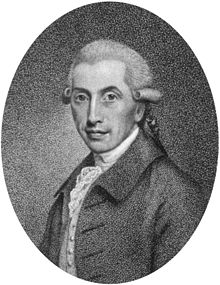
John Jebb (1736–1786) was an English divine, medical doctor, and religious and political reformer.
Life
Jebb was the son of John Jebb, Dean of Cashel, a member of the Irish branch of a distinguished family which came originally from Mansfield in Nottinghamshire: among his Irish cousins was John Jebb, Bishop of Limerick and the bishop's brother Richard Jebb, judge of the Court of King's Bench (Ireland). His mother was Anne Gansel, daughter of David Gansel of Donnyland House, Colchester, and sister of Lieutenant General William Gansel, who was noted as the protagonist in Gansel's case (1774), on whether a lodger had a legal right to resist being evicted from his lodgings.
John Jebb was educated at Peterhouse, Cambridge, where he was elected fellow in 1761, [1] having previously been Second Wrangler at Cambridge in 1757. [2] He was a man of independent judgement, and he and his wife Ann warmly supported the movement of 1771 for abolishing university and clerical subscription to the Thirty-nine Articles. [3] In his lectures on the Greek New Testament he is said to have expressed Socinian views. In 1775 he resigned his Suffolk church livings, and two years afterwards graduated M.D. at St Andrews. He practised medicine in London and was elected a fellow of the Royal Society in 1779. He and Ann continued to be involved in political reform.
Views
Like Edmund Law and Francis Blackburne, he was an advocate of soul sleep. [4]
Jebb was a keen supporter of the American Revolution. [5] He co-founded the Society for Constitutional Information in London in 1780, and was a leading figure in the early 1780s Association movement which pioneered the campaign for parliamentary reform that was carried on by the nineteenth-century Chartists.[ citation needed]
Notes
- ^ Dyer, George (1814). History of the University and colleges of C ambridge.
- ^ "Jebb, John (JB754J)". A Cambridge Alumni Database. University of Cambridge.
- ^ Page, Anthony (1 November 2008). "'A Great Politicianess': Ann Jebb, Rational Dissent and politics in late eighteenth‐century Britain". Women's History Review. 17 (5): 743–765. doi: 10.1080/09612020802316736. ISSN 0961-2025. S2CID 145808900.
- ^ Anthony Page John Jebb and the Enlightenment origins of British radicalism p68
- ^ Page, Anthony (April 2002). "'Liberty has an Asylum': John Jebb, British Radicalism and the American Revolution". History. 87 (286): 204–226. doi: 10.1111/1468-229X.00221. ISSN 0018-2648.
References
- This article incorporates text from a publication now in the public domain: Chisholm, Hugh, ed. (1911). " Jebb, John". Encyclopædia Britannica. Vol. 15 (11th ed.). Cambridge University Press. p. 299.
- Gascoigne, John. “ Jebb, John (1736–1786).” Oxford Dictionary of National Biography. Ed. H. C. G. Matthew and Brian Harrison. Oxford: OUP, 2004. Online ed. Ed. Lawrence Goldman. October 2005. 7 May 2007.
- Page, Anthony. John Jebb and the Enlightenment Origins of British Radicalism. Praeger Publishers, 2003. ISBN 0-275-97775-7